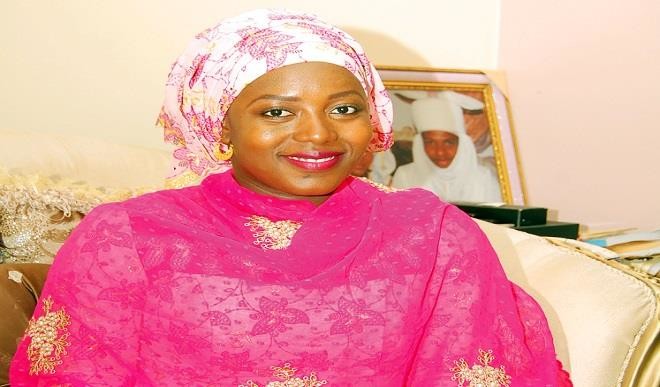
When did your NGO start?
While growing up, I had passion for helping people. My grandfather was a district head and he always took people into his house and helped them; he was one of my greatest motivations. I told myself then that, when I grew up I would open an orphanage. When I got married I told my husband about my dream, he encouraged me, but told me not to limit my initiative to a few people. He advised that I expand to an NGO. That was how the idea came about. It has been in existence for almost a year now.
How has the NGO impacted lives?
During the launching, we laid out programmes that we wanted to embark upon. We made these known to those invited. We ended up choosing 250 beneficiaries, some of who were pregnant women, orphans, vulnerable children and women farmers.
After that, we trained traditional birth attendants. The NGO intends to go national but we decided to start with Zamfara, my state, because I know the people there and what they need. Before we commenced the training of the traditional birth attendants, we went to the district heads, spoke with them and asked them to talk to their people. We intimated them about the kind of people we wanted for the project. The training was a success, we trained 50 people out of the 200 we were supposed to train, and we intend to train another batch soon.
Most of the women trained were from the rural areas; you can’t even access the villages by car. In some places we had to use boat to cross. After the training, we went for routine checks and the feedback was very positive.
We know most women from those areas don’t allow men examine them, so with the help of the TBA we were able to help and this got other people interested, and so they are anticipating the next batch of training.
Where did the funds you used for the projects come from?
During the launching we had a fund raiser, it was successful. Most of the projects we have executed were expensive, because we had to bring professionals to come and conduct the training. When these people knew that the training was taking place in Zamfara, they charged more.
It was expensive but with the help of the funds raised during the launching, we have been able to cater for some of the trainings. We can’t go for donor agencies now, until we have something to show them. But we have already started applying for funds from some of the agencies.
The North has a big challenge when it comes to VVF. Is the NGO working towards assisting women with VVF?
This is actually one of our goals. We have contacted a teaching hospital in Morocco. We travelled there and they have promised to help. We signed a contract with them, hopefully we would hear from them soon. We intend to tackle the issue of VVF zonally, and also the issue of cataract. The teaching hospital will be coming to help us with these issues.
Early marriage is another issue in the North, what is your NGO doing to address this?
There is a contradiction when you talk of early marriage in the North. People see you as one who wants to go against tradition and religion. But as an NGO, the best we can do is go through the traditional rulers. Some of these traditional rulers are very educated, so they know what we are talking about. If you go to a house where they have like six girls, most of them hawk items, and so they feel if she goes to school how will they feed? They are also concerned with the marriage items she will take to her husband’s house, where will the money come from? But now in Zamfara there are enlightenment programmes, telling them about the benefits of their children going to school.
We have this programme whereby when we go to a house, we tell them that we would give them an allowance and they should allow their daughters attend school. We can’t carry on like that, so we are trying to seek the assistance of the government.
Presently we are helping 200 girls, but they still look for other means to fend for themselves. But even with us giving the parents money, it hasn’t helped much because they take the money and we don’t know if the girls go to school or not. When we check with the school register, some have their names there, but during market days a majority of them leave for the market. They claim they can’t afford to miss market days.
For someone who read political science and intends to read law, why do you focus your NGO on health, education and empowerment?
This is a question I have been asked frequently. I choose health, education and empowerment because they are key issues. These are the reoccurring topics I have heard since I was a child, some people have succeeded in helping, but the problem is still there.
The key issues in the North are basically centred around health, girl-child education, youth empowerment and more. We can’t change what the government cannot do, but at least we can help or serve as a medium for the government to help the society. The least we can do is help communities, and with the right backing we can do more, that is our hope and prayer.
What has been the success rate with the training of the traditional birth attendants?
We called a registered nurse from the association of nurses and midwifery who taught them. Some of the traditional birth attendants have secondary school education hence it was easier to train them. Some of them are not educated but very experienced, they are older and have been taking deliveries for a long time. We also taught them that when they have a problem they can’t handle, they should go to the hospital.
We gave them referral forms, we are in partnership with each local government hospital, so when they go with the referral they know it is from a trained traditional birth attendant. The traditional birth attendants have been very helpful, and the local government hospitals have been cooperating.
Can you shed more light on the referral forms?
Not all the traditional birth attendants went to school, so we use characters to illustrate for them on the form. On it we have an illustration of pregnant women, which means maternity and where you see mosquito you detect it is malaria. Most of the feedback copies we have from the hospitals are mostly of delivery of pregnant women.
Our training sessions with the traditional birth attendants have also taught them hygienic measures to be taken during delivery. We have 14 to 14 characters on the referral form, we have also told them to encourage the women to go to hospital.

 Join Daily Trust WhatsApp Community For Quick Access To News and Happenings Around You.
Join Daily Trust WhatsApp Community For Quick Access To News and Happenings Around You.


